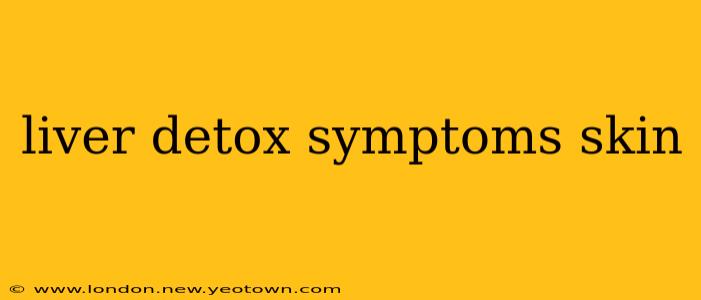Our skin, the body's largest organ, often acts as a mirror, reflecting what's happening internally. When our liver, a vital organ responsible for filtering toxins, isn't functioning optimally, it can manifest in various skin conditions. This isn't about a quick-fix "detox tea"; rather, it's about understanding the subtle (and sometimes not-so-subtle) signals your skin might be sending about your liver's health. Let's delve into the fascinating connection between liver health and skin symptoms.
Imagine your liver as a tireless worker in a bustling city. It processes nutrients, filters waste, and combats harmful substances. When this vital organ is overburdened – whether by poor diet, environmental toxins, or underlying health conditions – it can struggle to keep up. This struggle often shows up on your skin.
Common Skin Manifestations of Liver Issues
Many people associate liver problems with jaundice (yellowing of the skin and eyes), but other, less obvious signs are often overlooked. These can include:
-
Acne and Breakouts: A sluggish liver can lead to a buildup of toxins in the bloodstream. These toxins can contribute to inflammation and clogged pores, resulting in acne breakouts, particularly in adults.
-
Dry, Itchy Skin: The liver plays a vital role in producing bile, which helps with fat digestion and nutrient absorption. When bile production is impaired, it can negatively impact skin hydration, leading to dryness and itchiness.
-
Eczema and Psoriasis: These chronic inflammatory skin conditions are sometimes linked to liver dysfunction. While the exact relationship is complex and requires further research, some studies suggest a connection between impaired liver function and the severity of these conditions.
-
Skin Rashes and Hives: An overabundance of toxins in the bloodstream can trigger allergic reactions, manifesting as rashes or hives. These rashes can be itchy and sometimes accompanied by other symptoms like fatigue or digestive issues.
-
Yellowing of the Skin and Eyes (Jaundice): This is a more severe sign indicating significant liver damage. It occurs when bilirubin, a byproduct of red blood cell breakdown, builds up in the blood due to liver impairment. If you notice jaundice, seek immediate medical attention.
What if My Skin Shows These Symptoms?
It's crucial to remember that skin problems can stem from various causes, and skin symptoms alone aren't definitive proof of liver issues. However, if you notice persistent or worsening skin problems coupled with other symptoms like fatigue, digestive problems, or changes in urine color, it's vital to consult a healthcare professional. They can conduct tests to assess your liver function and determine the underlying cause of your symptoms.
How Can I Support My Liver Health?
While this article isn't medical advice, supporting your liver health through lifestyle changes can be beneficial for overall well-being and may positively impact your skin. These strategies include:
-
Adopting a Healthy Diet: Focus on a balanced diet rich in fruits, vegetables, and whole grains. Limit processed foods, excessive sugar, and saturated fats.
-
Staying Hydrated: Drinking plenty of water helps flush out toxins and supports liver function.
-
Managing Stress: Chronic stress can negatively impact liver health. Practicing stress-reducing techniques like yoga, meditation, or spending time in nature can be beneficial.
-
Getting Enough Sleep: Adequate sleep is crucial for overall health, including liver function.
Can I Detox My Liver?
H3: What are the signs of liver damage?
Signs of liver damage can range from subtle to severe. Subtle signs might include fatigue, unexplained weight loss, or changes in bowel habits. More severe signs include jaundice (yellowing of the skin and eyes), abdominal swelling (ascites), and easy bruising. If you experience any of these symptoms, consult a doctor immediately.
H3: What foods are good for liver health?
Foods rich in antioxidants, such as cruciferous vegetables (broccoli, cauliflower, kale), berries, and leafy greens, are beneficial for liver health. Other liver-supporting foods include beets, garlic, and turmeric. A diet low in processed foods, saturated fats, and added sugars is also crucial.
H3: What are the best liver detox drinks?
While there's no scientifically proven "liver detox drink," staying well-hydrated with water is crucial. Some people find that incorporating hydrating drinks like herbal teas (such as dandelion tea or milk thistle tea) can aid overall well-being. However, consult a healthcare professional before significantly altering your diet or incorporating herbal remedies.
H3: What are the most common causes of liver problems?
Common causes of liver problems include alcohol abuse, viral hepatitis infections (A, B, C), non-alcoholic fatty liver disease (NAFLD), and certain autoimmune disorders. Genetic factors can also play a role.
Remember, your skin can offer valuable clues about your internal health. Paying attention to these signals and seeking professional guidance when necessary are crucial steps in maintaining overall well-being. This information is for educational purposes only and does not constitute medical advice. Always consult a healthcare professional for any health concerns.

